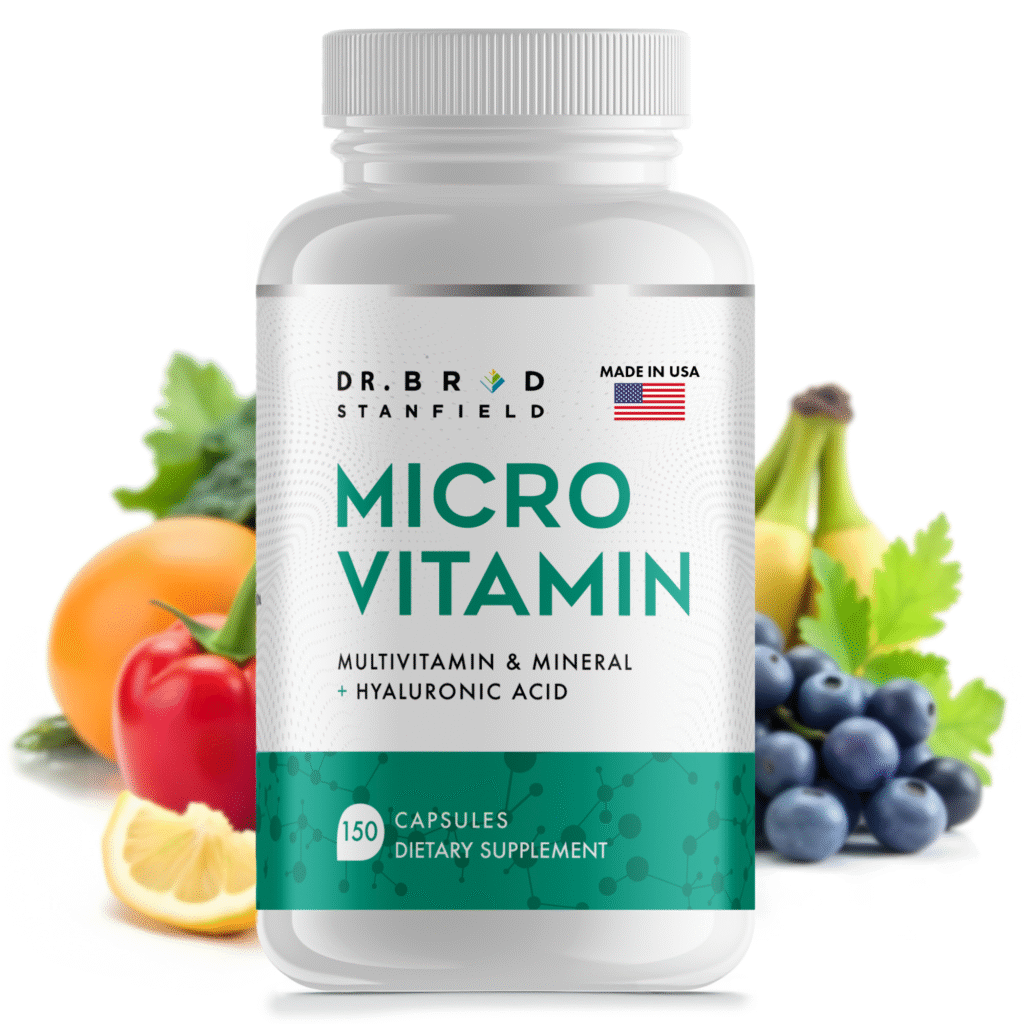
In this post we will review the supplements Dr Brad Standfield currently takes.
Table of Contents
ToggleMicroVitamin+ Powder
Takes 1 scoop daily for enhanced brain health, smoother skin, better exercise performance, and improved gut health.
Omega-3 (DHA/EPA)
Takes 1g daily to support cardiovascular and brain health while helping to reduce inflammation.
Sleep – w/ Melatonin, Magnesium Glycinate, and Glycine
Takes 1-2 hours before bed to help shorten the time to fall asleep and improves overall sleep quality.
Includes Melatonin 300mcg, Magnesium Glycinate 126mg, and Glycine 2,500mg
What is MicroVitamin?
MicroVitamin is a highly customized supplement developed by Dr Brad, now in its sixth iteration.
It comes in two forms: the standard MicroVitamin capsules and the expanded MicroVitamin+ powder.
Dr Brad uses MicroVitamin+ powder because it contains all the core nutrients of the standard MicroVitamin capsules—vitamins, minerals, TMG, and hyaluronic acid—plus four additional ingredients — collagen peptides, creatine, psyllium husk, and taurine — in one scoop.
The standard MicroVitamin capsules still provide the same essential multivitamin/mineral base, TMG, and hyaluronic acid.
| MicroVitamin (Capsules) | MicroVitamin+ (Powder) | |
|---|---|---|
| Shared Nutrients | Multivitamin & Mineral that notably includes:Magnesium Taurate 126 mgNicotinamide (vit. B3) 35 mgVitamin D3 1 000 IUVitamin K2 MK-7 90 µgZinc 8.25 mgTrimethylglycine (TMG) 500 mgHyaluronic Acid 200 mg | |
| Exclusive to MicroVitamin+ Powder | Not Included | Collagen Peptides 12.5 gCreatine Monohydrate 5 gPsyllium Husk 2.5 gTaurine 1 g |

The One Supplement Dr Brad Will Add In At Age 45:
GlyNAC 1 gram
Glutathione is a powerful antioxidant, and a critical regulator of oxidative stress and immune function.
There is data to “suggest that there is a continuous, linear increase in oxidative events throughout adult life but that the capacity of the Glutathione antioxidant system is maintained until 45 years and then declines rapidly.” ( https://pubmed.ncbi.nlm.nih.gov/12398937 )
We have evidence from a human, placebo-controlled study that supplementing with the Glutathione precursors, Glycine & NAC, corrects the Glutathione deficiency in older adults and improved hand grip strength ( https://academic.oup.com/biomedgerontology/advance-article/doi/10.1093/gerona/glac135/6668639 )
Medications Dr Brad Takes
Below are the three medications Dr Brad takes.
Finasteride 1mg (for males only)
Finasteride is a molecule that blocks the conversion of Testosterone to Dihydrotestosterone, and is used in clinical medicine to reduce male pattern baldness and shrink the size of the prostate.
We have a long-term, placebo controlled trial showing that finasteride reduces prostate cancer rates, and a trend toward reduced mortality rates.
( https://www.nejm.org/doi/10.1056/NEJMc1809961 )
Finasteride is currently available for $4.20 a month:
https://costplusdrugs.com/medications/finasteride-1mg-tablet
Rosuvastatin 5mg & Ezetimibe 10mg
Rosuvastatin and Ezetimibe are a cholesterol-lowering medications. Despite a great diet and regular exercise, Dr Brad’s LDL-c levels were 73 mg/dL and ideally he’s targeting a level < 60 mg/dL.
Rosuvastatin is hydrophilic meaning that it doesn’t get into places it shouldn’t, namely muscle and fat.
It is currently available for $3.60 a month:
https://costplusdrugs.com/medications/rosuvastatin-5mg-tablet
Supplements/Medications Dr Brad is Excited About & Awaiting More Data
Rapamycin
Over and over again when the Interventions Testing Program trials Rapamycin in genetically diverse mice, it extends both male and female lifespan.
Because of its mechanism of action, Dr Brad has set up a clinical trial combining regular exercise with either Rapamycin or Placebo to see if Rapamycin improves muscle performance.
While Dr Brad is very excited about Rapamycin’s potential, he doesn’t think it should be used outside of clinical trials to assess that it’s both safe and effective
17-Alpha Estradiol
This is a “non-feminizing” type of estrogen that the Interventions Testing Program demonstrated a lifespan extension in males. There’s also data showing an improvement in muscle strength.
Similar to Rapamycin, Dr Brad is very excited about this molecule, however he doesn’t think that it should be used outside of clinical trials to assess both safety and efficacy.
Supplements Dr Brad Used To Take But Then Stopped
NMN/NR:
There’s interesting mice and single cell studies regarding NAD+ precursors, however the human data demonstrating a benefit is lacking. Dr Brad focuses on stopping his NAD from declining by using a small dose of Nicotinamide in MicroVitamin, regular exercise, a great diet, periods of safe fasting, and restful sleep.
Furthermore we don’t know the long-term effects of boosting NAD+ to very high levels.
Resveratrol/Pterostilbene:
The research around using molecules to activate sirtuin-1 is very conflicting. We may not need to further activate sirtuin-1 if we already exercise, sleep well, and have a great diet.
Furthermore, it’s unlikely that resveratrol/pterostilbene directly activates sirtuin-1 anyway. There was a paper published in 2020 that used CRISPR technology that explored how resveratrol/pterostilbene work and the authors found the following:
“The ability of resveratrol to inhibit cell proliferation and S phase transit was independent of the histone deacetylase sirtuin 1, which has been implicated in lifespan extension by resveratrol. These results establish that a primary impact of resveratrol on human cell proliferation is the induction of low-level replicative stress.” (https://pubmed.ncbi.nlm.nih.gov/32755594/)
Until there’s more compelling research, Dr Brad stopped taking both of these molecules.
Metformin/Berberine:
Metformin is a medication that Dr Brad prescribes to his Type 2 Diabetic patients, and the initial data suggested that it could extend lifespan of non-diabetic patient as well.
However, when the Interventions Testing Program (ITP) trialed metformin in 2016, there was no lifespan benefit: (https://www.ncbi.nlm.nih.gov/pmc/articles/PMC5013015/)
Towards the end of 2021 a randomized, placebo-controlled, human trial that ran for 21 years was published. This trial took people at high risk of developing Type 2 Diabetes, and tested whether metformin would improve death rates, heart disease, and cancer when compared with placebo. Unfortunately, there was no benefit seen: https://diabetesjournals.org/care/article/44/12/2775/138471/Effect-of-Metformin-and-Lifestyle-Interventions-on
Furthermore, there’s good data showing that metformin blunts the positive exercise effects: https://www.ncbi.nlm.nih.gov/pmc/articles/PMC6351883/
This data has convinced Dr Brad to stop taking metformin altogether. Crucial to note though that for pre-diabetics and Type 2 diabetics, metformin is a wonderful medication.
Quercetin/Fisetin:
The Interventions Testing Program trialed Fisetin, and unfortunately there was no healthspan, lifespan, or senolytic activity seen. Therefore in Dr Brad’s opinion, the preclinical work does not support the use of Quercetin or Fisetin supplements.
There are a number of human studies ongoing, and until we have robust, published data showing a benefit, Dr Brad stopped taking both Quercetin & Fisetin. See this video here: https://youtu.be/Q3SX9B0QNWY
Ashwagandha:
There is some human evidence to suggest that Ashwagandha can improve anxiety levels. Dr Brad didn’t notice a difference, and he made the decision to stop Ashwagandha to reduce my ‘pill-burden’. This is more of a personal, rather than evidence-based choice.
Sulforaphane:
Sulforaphane is a potent activator of an enzyme called NRF2, the ‘master’ antioxidant switch. There are promising cell and mice studies, but at this stage the human data is lacking.
Apigenin:
Apigenin is an inhibitor of an enzyme called CD38, and CD38 might be a reason why in some tissues, NAD+ levels go down as we age. There are exciting cell and mice studies that have used Apigenin, but much like Sulforaphane there is a lack of human data.


